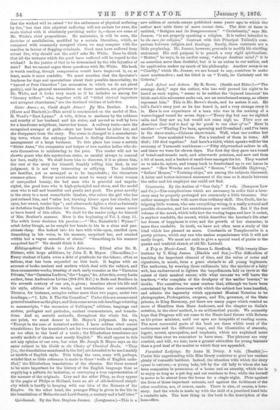BibliogrOldcal Guide to Latin Literature. Edited after Dr. E. Hubner,
with large additions, by John E. B. Mayor. (Macmillan.)— Every student of Latin owes a debt of gratitude for the labour, often so tedious, that has boon expended on this book. It begins with an account of books ancient and modern which deal with the subject, and then enumerates works, treating of such early remains as the " Carmina Privata," the " Carmine Ludicra," the "Loges," dx. After this, every Latin author, from Andronicus Livius (284-201 B.C.) to Bede and Bonifaco in the seventh century of our era, is given; treatises about his life and his style, editions of his works, and translations are enumerated. Terence, for instance, occupies rather more than two pages, under two headings,—" 1. Life. 2. The Six Comedies." Under this are enumerated general treatises on the plays, and then come seven sub-headings referring to manuscripts, "the recension of Calliopus," editions, language and metres, prologues and periochm, ancient commentators, and transla- tions. And so, mutatis inutandis, throughout the whole list. On one point, we must demur to Mr. Mayor's judgment. He says, "Except in the ease of technical authors, I have seldom cited recent translations; for the translator's art for two centuries has sunk amongst us too often to the level of a trade ; the Elizabethan translators are mostly models of chaste and manly English." We shall oppose to this not any opinion of our own, but what Mr. Joseph B. Mayor says on the same subjeot in his Guide to the Choice of Classical Books. "They [i.e., the translations mentioned in the list] are intended to be used mainly as Models of English style. This being the case, some will, perhaps, wonder that so little reference is made to those 'wells of English unde- filed,' the Elizabethan translations of the classics. But these seemed to be more important for the history of the English language than as supplying a pattern for imitation, or conveying a true representation of the manner of the originals. Livy and the elder Pliny, as they appear in the pages of Philps or Holland, have an air of old-fashioned simpli- city which is hardly in keeping with our idea of the Romans of the Empire. On the other hand, the younger Pliny is given to the life in the translations of Melmotte and Lord Ossory, a century and a half later."


































 Previous page
Previous page